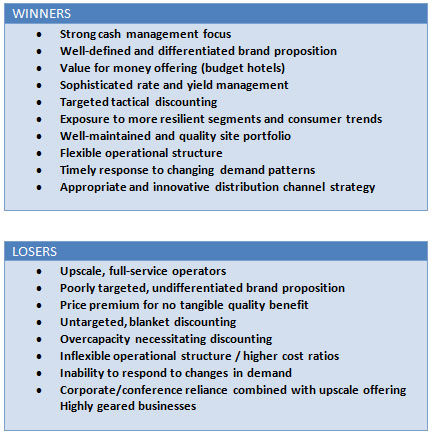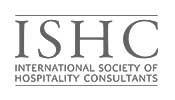The downturn’s aftermath: 10 priorities for managing in a recession | By Angelos Loizou, ISHC
24 September 2009
-
Take a closer look
The industry is adopting new trends and practices. To handle the crisis successfully, hotel companies must understand the broader picture and the downturn’s specific features—what makes it different. In doing so, they must come to a true realization of their surroundings, not one that suits or satisfies their particular needs.
-
Act decisively
During crises, people can be categorized into three methods of response: Those who wait for things to happen, those who wonder what has happened and those who plan before things happen. Most often, leaders of a successful company fall into the third group. Decisive action refers to the will for timely and preventive action. We must neither follow developments nor adopt a passive attitude. This is achieved by focusing strengths on quality and identifying potential risks.
-
Review the financial figures (cash is king)
Reviewing the financial figures mostly relates to:
• renegotiating funding;
• maximizing asset performance; and
• performance of operations in conjunction with the investment to create liquidity.
-
Focus on what really matters
A business, for example, can reap significant benefits if it realizes how much energy or resources it might be spending on products, services or even investments that don’t have any return in the end. An overall reduction of prices is rarely the solution.
-
Manage the cost base
By cost management, we refer to the targeted saving of financial resources, not generalized cuts in all operations. To achieve this, it would be helpful, for example, to identify complex procedures and simplify or redefine them with a view to increasing performance.
-
Manage information reliably
Especially during crises, access to reliable information is more important than ever. It’s extremely important for professionals in the tourism industry and state authorities to have access to the appropriate information that reflects trends and prospects, not only in the domestic market but also at global level. In this way, the decision-making process referred to in point No. 1 will be based on facts, not on hypotheses or assumptions.
-
Plan for different scenarios
Those who manage to differentiate themselves—as well as those who will be able to navigate successfully through unexpected and negative circumstances—are those who show flexibility, adaptability and the ability to plan and develop alternative financial or strategic models and scenarios. Setting up of a crisis/emergencies management committee is imperative.
-
Recognize the value of your people
A key factor of success is the existence of efficient, two-way communication and evaluation. Those who distinguish themselves are those who can give answers to questions such as: Who’s employed in the industry? Are these people the best or the least worst? What’s their culture? What are their expectations? What do we expect to have achieved by the end of the day? Training and appropriate reward incentives are equally important in terms of exploiting the potential of human resources.
-
Take your stakeholders with you
Evaluate the likely impact of the downturn on your stakeholders. Make sure you understand their agendas. Perception often is reality, so maintaining regular and open dialogue is essential.
-
Take advantage of the opportunities
Hoteliers and all other stakeholders in the tourism industry must have a long-term perspective. There’s no longer room for shortsighted practices. Quick-win attitudes are doomed to fail.
But who are the winners, and who are the losers? The following table summarizes some of the most important features of each group.

Angelos Loizou, ISHC (angelos.m.loizou@cy.pwc.com), a member of the International Society of Hospitality Consultants (www.ISHC.com), is the partner in charge of the Hospitality & Leisure Services division of PricewaterhouseCoopers Limited (www.pwc.com/cy) in Cyprus.

The International Society of Hospitality Consultants, ISHC, is a professional society of 200 members in 22 countries who are leading consultants in the hospitality industry. The Society is dedicated to promoting the highest quality of professional consulting standards and practices for the hospitality industry. Membership is by invitation only. ISHC as an organization represents a one of a kind collection of experience and expertise in the hospitality industry. ISHC members have expertise in over 30 different specialty areas in the hospitality industry and collectively have experience with over 50 hotel companies and nearly 100 brands worldwide. Additionally, ISHC members represent numerous prominent independent hotels throughout the world. ISHC members' clients include domestic and international, public and private hotel owners and investors, many leading financial institutions, Fortune 500 companies, food and beverage service firms, airlines, cruise lines, time share and vacation ownership companies, universities, state, national and international convention, hospitality travel and tourism bureaus.
Related News
The downturn's aftermath: Experiences gained, lessons learned | By Angelos Loizou, ISHC
17 September 2009
The downturn’s aftermath: Impact on tourist profiles and behaviours | By Angelos Loizou
8 October 2009
The downturn's aftermath: Attributes of success | By Angelos Loizou, ISHC
1 October 2009
Organization
International Society of Hospitality Consultants (ISHC)
ishc.com
1912 Hallman Street NE
USA - Atlanta, GA 30317
Phone: 678.973.2242
Email: abelfanti@ishc.com
Follow us on:
Recent News
Nominations Open for the 2026 Rising Star Award CALA co-hosted by ISHC and the Hotel Investment Group by Northstar to be presented at ALIS CALA
20 February 2026
ISHC Honors Bruce White with the Pioneer Award at ALIS
12 February 2026
Now Accepting Nominations for the 2026 Young Leader Award at Questex’s IHIF EMEA
22 January 2026

